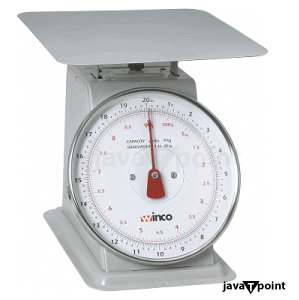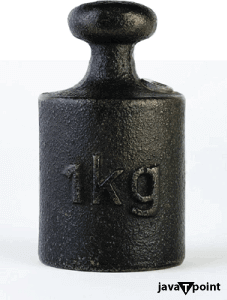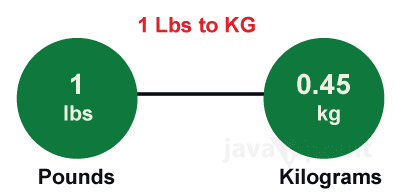Difference between Pound and Kilograms
Introduction
In a world of diverse measurement systems, pounds and kilograms stand as two of the most commonly used units for measuring mass. While many countries have adopted the metric system and exclusively use kilograms, others, like the United States, still favor pounds. Understanding these two units' differences is essential for international communication and for anyone who needs to convert between them.
Pound (lb)
The pound, denoted as "lb," is a unit of mass that traces its origins to the Roman libra. It is commonly used in the United States, the United Kingdom, and a handful of other countries that have not transitioned to the metric system. In the context of mass, one pound is approximately equal to 0.45359237 kilograms. This conversion factor allows you to convert between pounds and kilograms.
In terms of weight, one pound is equivalent to the gravitational force acting on an object with a mass of one pound on or near the Earth's surface.
Pounds are commonly used in everyday life in the United States to measure body weight, grocery items, and other objects. For example, when you step on a scale in the United States, your weight is often measured in pounds, and food products are often labeled with their weight in pounds or ounces.
It's important to note that in scientific and international contexts, the kilogram is the standard unit for mass, and the use of pounds is less common. However, in some specialized fields, such as aviation and engineering in the United States, pounds are still frequently used for convenience and historical reasons.
Significance of the Pound:
- Historical Significance: The pound has deep historical roots and has been a standard unit of measurement for centuries. Its use in trade and commerce dates back to the Middle Ages, making it an important part of economic history.
- Imperial and US Customary Systems: The pound is a fundamental unit in both the Imperial system (used in the UK) and the US Customary system (used in the United States). In these systems, it serves as the primary unit of mass for everyday purposes, such as measuring body weight, cooking ingredients, and weighing goods.

- Cultural Significance: The pound has cultural significance in countries that use it as their primary unit of mass. It is part of everyday life, from measuring portions in recipes to understanding one's weight. It's deeply ingrained in the culture of these nations.
- Specialized Use: While the metric system has become the global standard for scientific and international purposes, the pound is still widely used in certain specialized fields. For example, in aviation and aerospace, pounds are used for aircraft weight and balance calculations in the United States.
- Conversion and Trade: Understanding pounds and their conversion to the metric system (kilograms) is essential for international trade and communication. This is why it's important for individuals and businesses in countries using the pound to have a working knowledge of metric conversions.
The Kilogram (kg)
On the other hand, the kilogram is the base unit of mass in the International System of Units (SI), which is the modern form of the metric system. It is widely used worldwide and is the standard unit of mass in most countries. The kilogram is defined as the mass of the International Prototype of the Kilogram (IPK), a platinum-iridium cylinder carefully preserved at the International Bureau of Weights and Measures (BIPM) in France. One kilogram is equivalent to 2.20462 pounds.

In May 2019, the kilogram was redefined in terms of fundamental constants of nature rather than relying on a physical object like the IPK. It is now defined using the Planck constant (h), a fundamental constant of nature, and the speed of light (c). The kilogram is defined as.
[(6.62607015 × 10^-34 kg m^2 / s)*(9.1932631770 × 10^9 s^-1)]/(299,792,458 m/s^2)^2
Significance:
The kilogram (kg) holds significant importance in various aspects of science, industry, and everyday life. Here are some of the key significance and roles of the kilogram.
- Scientific Precision: The kilogram is a fundamental unit of measurement in the International System of Units (SI), the world's most widely used system of measurement. As a result, it plays a central role in scientific research, allowing for precise and consistent mass measurements in experiments and calculations.
- International Standard: The kilogram serves as an international standard for mass measurements. Its definition of fundamental constants (Planck's constant and the speed of light) ensures that mass measurements are consistent globally, regardless of the location or equipment used. Adopting the kilogram as a global standard promotes collaboration and consistency in scientific research, trade, and international relations. It ensures that mass measurements are universally understood and accepted.
- Commercial and Industrial Applications: The kilogram is essential for industries that rely on accurate mass measurements, such as manufacturing, agriculture, pharmaceuticals, and logistics. It ensures that products are produced and traded based on standardized mass measurements.
- Trade and Commerce: In international trade, accurate mass measurements are crucial for determining the cost and quantity of goods. The kilogram provides a standardized transaction unit, promoting fair trade and reducing the potential for disputes.
Standardization:The kilogram's role in standardization extends to various other units of measurement, such as the newton (for force) and the pascal (for pressure). These units are defined in terms of the kilogram, contributing to the consistency and accuracy of measurements in different fields
Difference between Kilograms and Pounds:
The main difference between pounds (lb) and kilograms (kg) lies in their units of measurement and their respective values:
Measurement System:
- Pounds (lb): Pounds are part of the Imperial system of units, commonly used in the United States and a few other countries. The Imperial system is not based on powers of ten and uses different units for various measurements, including weight.
- Kilograms (kg): Kilograms are part of the metric system, which is the standard system of measurement used worldwide for scientific, commercial, and industrial purposes. The metric system is based on powers of ten, making it highly systematic and easy to use.
Conversion Factor:
- Pounds (lb): One pound is approximately equal to 0.45359237 kilograms. This conversion factor allows you to convert from pounds to kilograms by multiplying by this factor.

- Kilograms (kg): One kilogram is equivalent to 2.20462 pounds. To convert from kilograms to pounds, you can use this conversion factor.
Global Usage:
- Pounds (lb): Pounds are primarily used in the United States and a few other countries that have not fully adopted the metric system. While pounds are used in certain contexts in these countries, they are not the standard unit for mass in most industries and scientific research.
- Kilograms (kg): Kilograms are the standard unit for mass measurement in most countries around the world. They are the primary unit used in scientific research, industry, commerce, and international trade.
Standardization:
- Pounds (lb): The definition of a pound historically relied on physical prototypes, which could vary slightly. However, efforts have been made to standardize it.
- Kilograms (kg): Kilograms were recently redefined based on fundamental constants of nature (Planck's constant and the speed of light), making the kilogram more precise and stable. This redefinition eliminated reliance on a physical prototype.
Symbol:
- Pounds (lb): Pounds are often symbolized by "lb," which comes from the Latin word "libra," meaning balance or scales.
- Kilograms (kg): Kilograms are symbolized by "kg," which is derived from the French "kilogramme."
In summary, pounds and kilograms differ in their measurement systems, conversion factors, global usage, standardization methods, and symbols. Kilograms are the more widely adopted and standardized unit of mass, while pounds are primarily used in specific regions and contexts.Understanding these differences is important for accurate measurement and conversion in various fields.
Similarities:
Pounds (lb) and kilograms (kg) are both units of mass, and they share some similarities
- Measurement of Mass: Both pounds and kilograms are used to measure mass, which is a fundamental property of matter representing the amount of substance an object contains.
- Subdivisions: Both units can be subdivided for more precise measurements. Pounds can be divided into ounces (oz), while kilograms can be divided into grams (g).
- Common Use in Daily Life: In various parts of the world, both pounds and kilograms are used in everyday life for activities such as measuring body weight, weighing ingredients in cooking, and determining the mass of objects.
- Conversion Factor: There is a well-defined conversion factor between pounds and kilograms, which makes it relatively easy to convert from one unit to the other. This factor is approximately 1 kilogram (kg) = 2.20462 pounds (lb).
- Importance in Trade: Both pounds and kilograms are used in trade and commerce, although the specific unit used can vary by region and industry. In international trade, it's common to see both units used, with conversions made as needed.
While there are these similarities, it's essential to remember that pounds and kilograms are distinct units of mass with different definitions, historical origins, and predominant usage in different parts of the world. Kilograms are part of the metric system, which is widely used globally, while pounds are more commonly used in a few countries that have not adopted the metric system. Understanding these differences is crucial when dealing with measurements and conversions.
Everyday Usage:
Everyday Uses of Pounds (lb):
- Body Weight: In the United States and some other countries, people commonly measure their body weight in pounds. When you step on a bathroom scale, the result is often given in pounds.
- Grocery Shopping: In the United States, food products are often labeled with their weight in pounds or ounces. Shoppers use pounds to estimate the quantity of items they are purchasing, such as meat, produce, and packaged goods.
- Exercise and Fitness: Many fitness enthusiasts in countries using pounds as the primary unit of mass use pounds to track their progress in weightlifting and bodybuilding. Dumbbells and barbells are often labeled with pound values.
- Cooking and Baking: Some recipes in countries using pounds call for ingredients to be measured in pounds or ounces. Bakers might use pounds to measure flour, sugar, and other ingredients.
- Weight Limits: In the United States, weight limits for checked baggage on airlines are often specified in pounds. Passengers need to ensure their luggage does not exceed the allowed weight in pounds.
Everyday Uses of Kilograms (kg):
- International Travel: Most countries around the world use kilograms for measuring baggage weight limits at airports. Travelers need to be aware of these limits when packing their suitcases.
- Medical Prescriptions: In many countries, medical prescriptions for medications are often specified in milligrams per kilogram of body weight, ensuring that patients receive appropriate dosages based on their mass.
- Kitchen Scales: Digital kitchen scales in metric countries often provide measurements in grams and kilograms, making it easy to weigh ingredients accurately for cooking and baking.
- Fitness and Health: In countries that use kilograms as the standard unit of mass, individuals measure their body weight in kilograms. This is also common in healthcare settings.
- Scientific Research: Kilograms are the standard unit of mass used in scientific research, making them crucial for accurate measurements and calculations in fields such as physics, chemistry, and biology.
These examples demonstrate how pounds and kilograms are used differently in various aspects of daily life, depending on the region's measurement system and conventions. Understanding which unit is commonly used in your area is essential for everyday tasks and activities.
Conclusion
Pounds and kilograms, with their distinct histories and applications, are units of mass that impact our lives in various ways. Understanding their differences, conversions, and cultural relevance is essential in a global context. As we continue to measure the world around us, knowing when to use pounds and kilograms ensures precision and accuracy in diverse fields, from science to daily tasks.
|

 For Videos Join Our Youtube Channel: Join Now
For Videos Join Our Youtube Channel: Join Now












